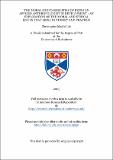Files in this item
The moral (im)possibilities of being an applied anthropologist in development : an exploration of the moral and ethical issues that arise in theory and practice
Item metadata
| dc.contributor.advisor | Overing, Joanna | |
| dc.contributor.author | MacLullich, Christopher | |
| dc.coverage.spatial | viii, 386 p. | en_US |
| dc.date.accessioned | 2018-06-12T13:26:45Z | |
| dc.date.available | 2018-06-12T13:26:45Z | |
| dc.date.issued | 2004 | |
| dc.identifier.uri | https://hdl.handle.net/10023/13958 | |
| dc.description.abstract | My broadest aim in this thesis is to explore some of the central ethical concerns of social anthropologists vis-a-vis the phenomena of development. In particular, what I want to bring out and examine is the dynamics of the 'moral experience' and 'moral force' of anthropologists in this area. I go about this by considering the historical unfolding of the anthropological conceptual and evaluative apprehension of planned social and economic change. On this basis, I also consider the nature of the critiques and contributions that social anthropology has generated. I also make an attempt to review the major conceptual moral controversies and agendas that are intrinsic to development from an anthropological perspective. Whilst the concepts and values that emanate from social anthropology are multi-faceted and many stranded, I believe that the anthropological standpoint is both distinctive and potentially counter hegemonic. I look specifically at the moral resources that can be unearthed from the emerging field of 'development ethics' which is largely articulated in terms of the maxims that are fundamental to Western moral and political traditions. I attempt to set out the terrain of the ethical deliberation of anthropologists involved in development in terms of some of the moral difficulties of Western society. I argue that Western moral reasoning, as a result of deep disagreements about the sources of value human life and society, tends to rely upon procedural, instrumental and coercive ethical frameworks. On this basis, one of my assertions is that communitarian arguments, whilst also being needed as a healthy antidote to the excesses of liberal individualism, also constitute a reflection of the aspirations of people(s), many of whom are beleaguered by the alienation, atomism and instrumentalism of modern society. The communitarian perspective also underpins a political commitment to supporting those besieged indigenous communities that struggle to defend their integrity in the face of the aggressive intrusions of the market mentality. This may involve supporting the maintenance of 'traditional' versions of moral reasoning, well being, and sociality (such as indigenous life-worlds), collective rights in the face of the fragmentary and individuating neo-liberal development policies, and to support the 'construction of new associative networks such as 'new social movements' that represent the aspirations, and embody the values, of marginalised and disempowered social groups. | en_US |
| dc.language.iso | en | en_US |
| dc.publisher | University of St Andrews | |
| dc.subject.lcc | GN397.5M6 | |
| dc.subject.lcsh | Applied anthropology | en |
| dc.subject.lcsh | Ethnology--Moral and ethical aspects | en |
| dc.subject.lcsh | Economic development | en |
| dc.title | The moral (im)possibilities of being an applied anthropologist in development : an exploration of the moral and ethical issues that arise in theory and practice | en_US |
| dc.type | Thesis | en_US |
| dc.contributor.sponsor | Economic and Social Research Council (ESRC) | en_US |
| dc.contributor.sponsor | Society for Latin American Studies (Great Britain) | en_US |
| dc.type.qualificationlevel | Doctoral | en_US |
| dc.type.qualificationname | PhD Doctor of Philosophy | en_US |
| dc.publisher.institution | The University of St Andrews | en_US |
This item appears in the following Collection(s)
Items in the St Andrews Research Repository are protected by copyright, with all rights reserved, unless otherwise indicated.

